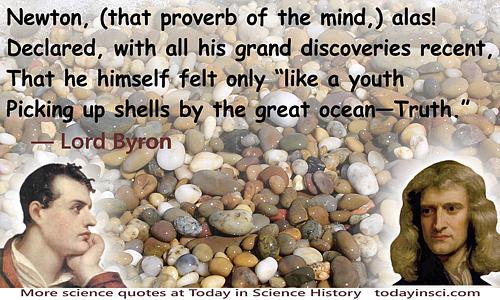 (source)
(source)
|
Lord George Gordon Byron
(22 Jan 1788 - 19 Apr 1824)
British romantic poet who is noted for his Romantic narrative poems. A daughter, Augusta Ada, was born during a brief marriage to Annabella Milbanke (1815) who left him the following year, because of an abusive relationship. Byron never saw them again. His daughter became renowned as Ada Lovelace, a mathematician credited with writing the world's first computer programme while associated with George Babbage.
|
Lord Byron - Illustrated Quote
On Isaac Newton's “Playing on the Seashore”
Pebble Background - Medium (500 x 300 px)
More Lord Byron science quotes >>
“Newton, (that proverb of the mind,) alas!
Declared, with all his grand discoveries recent,
That he himself felt only ‘like a youth
Picking up shells by the great ocean—Truth.’”
Declared, with all his grand discoveries recent,
That he himself felt only ‘like a youth
Picking up shells by the great ocean—Truth.’”
— Lord Byron
Lines from poem, “Don Juan.”
More information for Isaac Newton “Playing on the Seashore” quote >>
Lord Byron - Illustrated Newton's “Seashore” quote - Ocean Background - 500px >>
More Isaac Newton quotes >>
Background image of pebble beach from Creative Commons (source). For more information on the text, see the Today in Science History page for Isaac Newton quotes. (source)
See also:
- Science Quotes by Lord George Gordon Byron.
- Lord Byron - On Newton's “Playing on the Seashore” illustrated quote - Pebble Background - Large 800px.
- Lord Byron - On Newton's “Playing on the Seashore” illustrated quote - Ocean Background - Medium 500px.
- Lord Byron - On Newton's “Playing on the Seashore” illustrated quote - Ocean Background - Large 800px.







